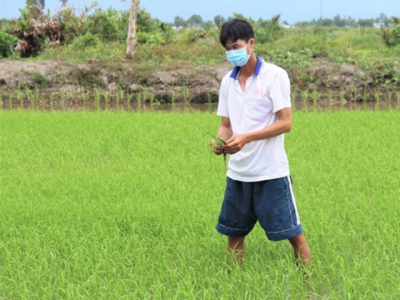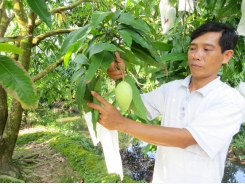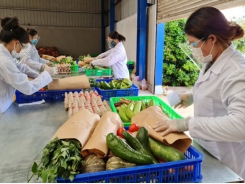Elevating rice and mango value chains in six Mekong Delta provinces

Two mainstay value chains in Mekong Delta namely rice and mango will be promoted in terms of adaptability and resistant capacity over impacts of climate changes.
The impacts of climate change have driven a series of challenges to the Mekong Delta economic region. Photo: Pham Hieu.
7 million euros for two rice and mango industries
The Mekong Delta is Vietnam's largest agricultural production hub, accounting for more than 50% of total rice production, 70% of fruit production, and 95% of rice exported by the nation. However, intensive agricultural and seafood production, along with the effects of climate change, has created a succession of difficulties for the core economic region.
Over the last several years, the Vietnamese government has implemented a number of policies and guidelines, called on investments, and enlisted international assistance to carry out development programs that assist the Mekong Delta in restructuring and transforming its agricultural sector focus.
The transition is aimed at achieving sustainable development, adapting to climate change in a flexible manner, human protection, and ecological balance in the area.
The German government has consistently undertaken several agricultural, environmental, and climate change adaptation initiatives in the Mekong Delta, assisting Vietnam in its attempts to sustainably develop the area.
The Green Innovation Center Project in Vietnam's Agriculture and Food Industry (GIC Vietnam) is the German Government's next package of technical assistance commitments, coordinated and implemented by the Ministry of Economic Cooperation and Rural Development (MARD), the German Development Cooperation Organization (GIZ), and the governments of six provinces, including An Giang, Dong Thap, Can Tho, Hau Giang, Kien Giang, and Soc Trang during 2020-2014.
The GIC Vietnam Project will assist farmers in improving the quality of their goods to meet requirements by encouraging and building their ability to implement innovative solutions and competitive economic models. worldwide market norms of quality.
The project will contribute to the sustainable improvement of agricultural systems, therefore increasing the efficiency of natural resource management and use, as well as increasing resistance and flexibility to the effects of climate change. Rice and mango are the two primary agricultural value chains in the Mekong Delta.
Benefits accrue to 20,000 agricultural families in the Mekong Delta
The five-year GIC Vietnam initiative will assist 20,000 small-scale farming families in enhancing the quality of their goods and increasing their revenue by 15% to 20%. The stakeholder will be taught and will adopt ways to mitigate negative environmental consequences.
The project would support private sector engagement, particularly small and medium-sized firms and cooperatives, in order to establish links between producers and businesses and to foster direct collaboration based on shared requirements and interests of value chain participants.
Participating enterprises and cooperatives will be able to enhance their capacity and production processes, consequently increasing a variety of critical business performance metrics. Around 200 new employment are created, mostly for women and young people.
Mr. Le Duc Thinh, Director of the Department of Economic Cooperation and Rural Development, said that Vietnam is very appreciative of Germany's ongoing assistance in accelerating the transition to green and sustainable development. in the agriculture industry, sustainable.
Vietnam is anticipated to join the Project with the primary objective of fostering the development of innovative, appropriate, and realistic economic models for deployment in the two value chains of rice and mango in the Mekong Delta area. The initiative has a good effect by assisting in the enhancement of the quality, development of the image, and positioning of Vietnamese agricultural products in tough markets such as Europe or the United States.
GIC Vietnam is a component of the Green Innovation Centers Program in Agriculture and Food (GIC), a part of the German Federal Ministry for Economic Cooperation and Development's (BMZ) global anti-poverty initiative One World, No Hunger, which is being implemented in 15 countries in Africa and Asia by the German Development Cooperation (GIZ). Thus, in addition to assisting in the sustainable development of agricultural and rural regions in Vietnam, the GIC Vietnam Project contributes to the initiative's purpose.
The project will gather, evaluate, record, and share with member nations all effective models, successes, and lessons learned from activities performed in Vietnam. Members of the GIC Program and other nations engage in South-South and South-North collaboration via regional and international conferences, seminars, study excursions, the sharing of practical experiences and publications, and the development of knowledge management products.
Có thể bạn quan tâm
Phần mềm

Phối trộn thức ăn chăn nuôi

Pha dung dịch thủy canh

Định mức cho tôm ăn

Phối trộn phân bón NPK

Xác định tỷ lệ tôm sống

Chuyển đổi đơn vị phân bón

Xác định công suất sục khí

Chuyển đổi đơn vị tôm

Tính diện tích nhà kính

Tính thể tích ao hồ



 Farmers get more profits when applying farming techniques…
Farmers get more profits when applying farming techniques…  Most 5,000 tonnes of Ba Be fragrant winter…
Most 5,000 tonnes of Ba Be fragrant winter…